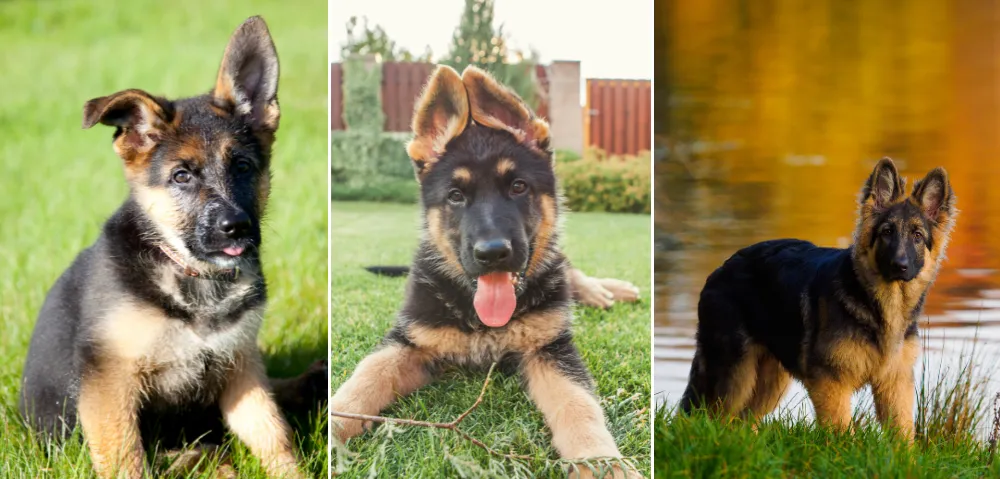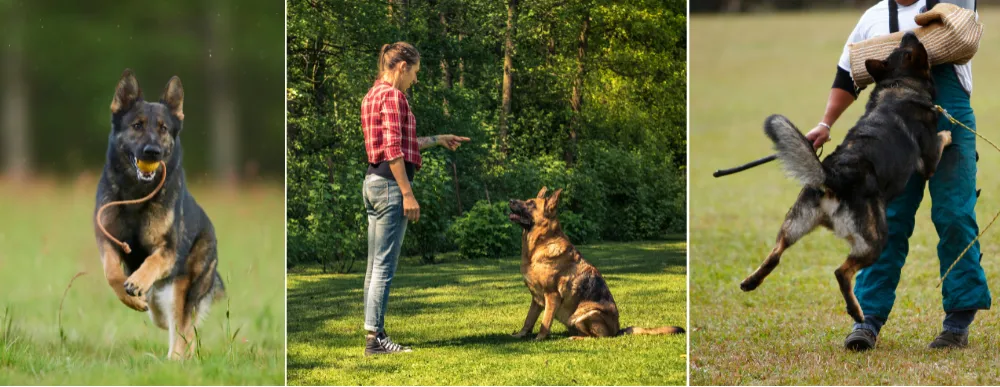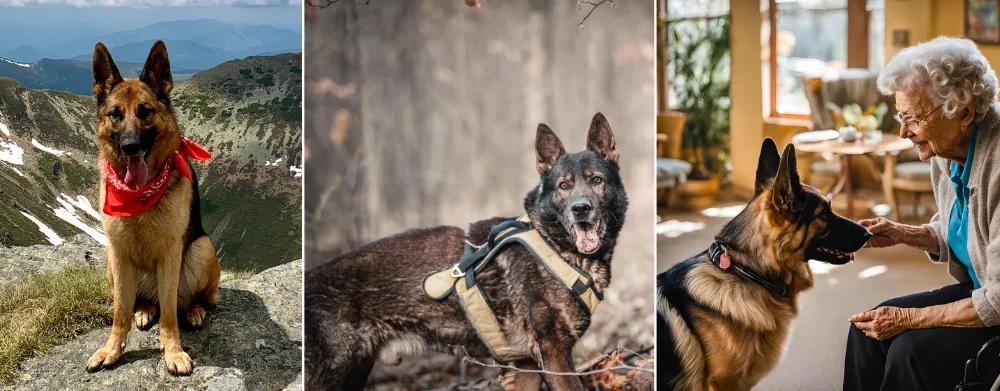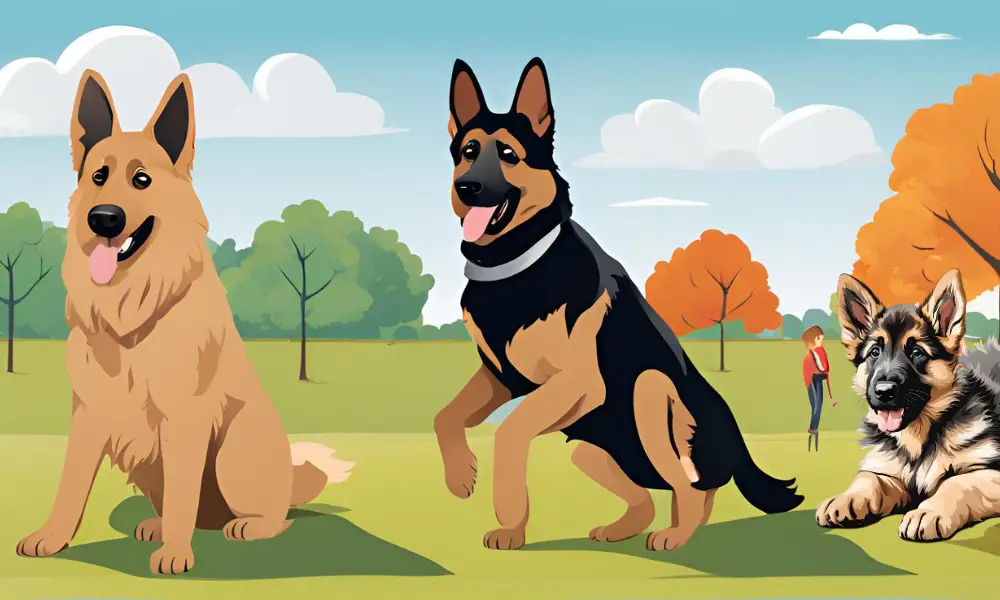German Shepherds are renowned for their intelligence, loyalty, and high energy levels, which make them exceptional working dogs and companions.
However, their energy requirements and activity levels, vary significantly depending on their age. Understanding these variations is crucial for ensuring their physical and mental well-being.
Topics
- Energy Levels Across Different Life Stages
- Puppy Stage (0-12 Months)
- Adolescent Stage (1-3 Years)
- Adult Stage (3-7 Years)
- Senior Stage (7+ Years)
- German Shepherd Energy Levels Table
- Conclusion
RELATED
- How to Raise a German Shepherd Puppy At Home
- Training German Shepherds for Families With Young Children
- Is German Shepherd Right for Apartment Living?
- Best Way to Take German Shepherd for Walk: A Complete Guide
- At What Age German Shepherds Slow Down?
- German Shepherd Teeth Problems: Causes, Prevention, Treatment
|| DON’T MISS! Today’s Deals on Chewy – Pet Foods, Products, Supplies, Toys and more…
01. Energy Levels Across Different Life Stages
Below are the energy levels of German Shepherds across different life stages.
01. Puppy Stage (0-12 Months)
German Shepherd puppies are bundles of energy. They are curious and eager to explore the world, often engaging in bursts of activity followed by rest.
During this stage, their energy is focused on:
- Exploring their environment
- Socializing with people and other pets
- Developing motor skills, as explained below.
Activity Needs:
- Daily Exercise: 5 minutes per month of age (e.g., a 3-month-old puppy needs about 15 minutes of structured exercise twice a day).
- Mental Stimulation: Puzzle toys, basic training, and supervised play.
| Pro Tip: Overexercising can harm their developing joints. |

What Are Motor Skills?
Motor skills in puppies refer to their ability to move and coordinate their muscles to perform various actions. These skills are crucial for their development and independence.
There are two main types of motor skills:
- Gross Motor Skills
- Fine Motor Skills
01. Gross Motor Skills
The Gross Motor Skills involve larger muscle groups and actions that require strength and endurance. Examples include:
- Walking and Running: Puppies gradually learn to walk and run as they develop muscle strength and coordination.
- Jumping and Climbing: As their muscles strengthen, puppies start to explore more challenging movements like jumping and climbing.
- Playing: Activities like chasing, wrestling, and playing with toys help develop gross motor skills.
02. Fine Motor Skills
The Fine Motor Skills involve smaller muscle groups and require more precise movements. Examples include:
- Chewing and Eating: Using their jaws and teeth to chew food and toys.
- Pawing and Scratching: Coordinating their paws to scratch, dig, or manipulate objects.
- Grooming: Using their mouths and paws to groom themselves.
Motor Skills in Development Stages
Puppies develop motor skills in stages:
- Neonatal Stage (0-2 weeks): Limited movement; primarily reflexive actions like rooting and suckling.
- Transitional Stage (2-4 weeks): Begin to stand, walk, and interact with littermates.
- Socialization Stage (4-12 weeks): Rapid development of motor skills; puppies become more coordinated and active.
- Juvenile Stage (12 weeks and up): Continued refinement of motor skills as they grow and gain more control over their movements.
| Note: Healthy motor skill development is essential for a puppy’s growth, well-being, and ability to interact with their environment. |
02. Adolescent Stage (1-3 Years)
Adolescence is when German Shepherds reach their peak energy levels. They are physically capable of intense activity and require significant mental and physical stimulation to prevent boredom and destructive behaviors.
Activity Needs:
- Daily Exercise: 1.5 to 2 hours of physical activity (e.g., long walks, fetch, swimming).
- Training: Advanced obedience, agility training, or sports like Schutzhund can channel their energy positively.
- Mental Stimulation: Problem-solving games and interactive toys.

03. Adult Stage (3-7 Years)
Adult German Shepherds still possess high energy levels, but they are more balanced and controlled compared to their adolescent years. At this stage, they thrive on a mix of physical and mental challenges.
Activity Needs:
- Daily Exercise: 1.5 to 2 hours of varied physical activity.
- Engagement: Regular training refreshers, hiking, and advanced tasks like search-and-rescue or therapy work can keep them stimulated.

RELATED
- Role of German Shepherds in Therapy & Emotional Support
- Understanding the Prey Drive of German Shepherds
- German Shepherd Running Abilities: Speed, Distance, Endurance
- How Do German Shepherds Handle Hot Weather
- Ultimate Guide to German Shepherds Water Activities
04. Senior Stage (7+ Years)
Senior German Shepherds begin to slow down. Their energy levels decrease, and they may develop joint issues or other age-related conditions that require adjustments in their activity routine. However, they still need light exercise to maintain mobility and mental health.
Activity Needs:
- Daily Exercise: 30-60 minutes of low-impact activities (e.g., short walks, gentle play).
- Mental Stimulation: Simple games and light training to keep their minds active.
- Health Considerations: Regular vet checkups to address joint health and adapt exercise routines as needed.

RELATED
- Degenerative Myelopathy in German Shepherds | Causes & Prevention
- Hip Dysplasia in German Shepherds | Causes & Prevention
- Common German Shepherd Health Myths Debunked
- How to Extend the Lifespan of German Shepherd
- What Health Products Should Every German Shepherd Owner Have?
02. German Shepherd Energy Levels Table
Below is the information about German Shepherd energy levels by age in the tabular form.
| Life Stage | Age Range | Energy Level | Daily Exercise Needed | Recommended Activities |
|---|---|---|---|---|
| Puppy | 0-12 Months | High (Bursts of energy) | 5 minutes/month of age, 2x daily | Short walks, basic training, socialization |
| Adolescent | 1-3 Years | Very High | 1.5 to 2 hours | Long walks, fetch, agility, advanced training |
| Adult | 3-7 Years | High | 1.5 to 2 hours | Hiking, sports, advanced obedience training |
| Senior | 7+ Years | Moderate to Low | 30-60 minutes | Gentle walks, light play, simple games |
03. Conclusion
German Shepherds are energetic and intelligent dogs that require tailored exercise and mental stimulation throughout their lives. Understanding their energy levels by age ensures they remain healthy, happy, and well-adjusted companions. Always monitor your dog’s individual needs, as factors like health, genetics, and personality can influence their activity requirements.
If you like this post, please share it with others. You can also share your feedback in the comments section below.
Also Read
- Effective Methods for Crate Training German Shepherd Puppy
- What are Challenges of Training & Raising German Shepherd?
- What is the Average Intelligence of German Shepherds?
- How to Determine Most Desirable Traits in German Shepherd?




Leave a Reply